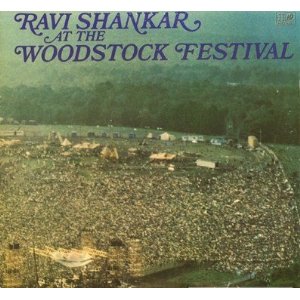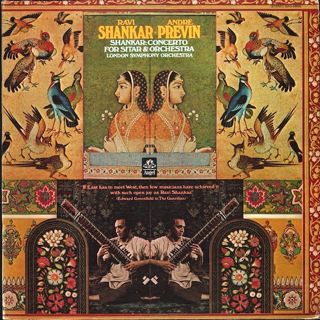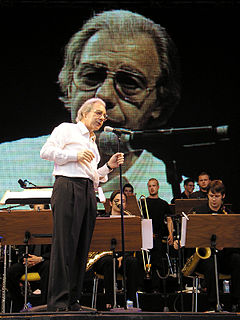
Raga rock is rock or pop music with a pronounced Indian influence, either in its construction, its timbre, or its use of Indian musical instruments, such as the sitar and tabla. In addition, rock music from the 1960s and 1970s that incorporates South Asian musical influences and instruments, along with Western ideas of the Indian subcontinent, is often regarded as raga rock.
Indo jazz is a musical genre consisting of jazz, classical and Indian influences. Its structure and patterns are based on Indian music with typical jazz improvisation overlaid. While the term itself may be comparatively recent, the concept dates at least to the mid-1950s. Musicians including John Coltrane, Yusef Lateef and others reflect Indian influences.

Improvisations is a 1962 LP album by Ravi Shankar. The opening piece is based on music from Shankar's score for Satyajit Ray's 1955 movie Pather Panchali with flutist Bud Shank playing in Indian style. Shankar composed "Fire Night" influenced by the 1961 Los Angeles fires and the song features jazz musicians Shank (flute) and Gary Peacock (bass) improvise over Indian percussion instruments. The concluding ragas are in classical Indian style: the first raga, Kirvani, with South Indian origin, and the second, Rageshri, with North Indian origin. The album was released in CD format by Angel Records in 1999 and has been described as a "visionary recording" by AllMusic reviewer Heather Phares.

At the Woodstock Festival is a live album by Indian classical musician Ravi Shankar that was released in 1970 on World Pacific Records. It was recorded on 15 August 1969, during the first day of the Woodstock Festival in upstate New York. Shankar's set took place during a downpour and he later expressed his dissatisfaction with the event due to the prevalence of drugs among the crowd.

Full Circle: Carnegie Hall 2000 is a live album by Indian musician and composer Ravi Shankar, released in 2001 through the record label Angel Records. Recorded at Carnegie Hall in October 2000 as part of a tour with Shankar's daughter Anoushka, the album contains five tracks and presents two ragas. The concert occurred sixty-two years after Shankar's first performance at Carnegie Hall and commemorated his eightieth birthday; the album was his first live recording in nearly twenty years. Full Circle was produced by Hans Wendl, mastered by Scott Hull, and mixed and engineered by Tom Lazarus. Featured are performances by Tanmoy Bose and Bickram Ghosh on tabla, and Anoushka and Ravi on sitar.

Ravi Shankar's Music Festival from India was an Indian classical music revue led by sitarist and composer Ravi Shankar intended for Western concert audiences and performed in 1974. Its presentation was the first project undertaken by the Material World Charitable Foundation, set up the previous year by ex-Beatle George Harrison. Long a champion of Indian music, Harrison also produced an eponymous studio album by the Music Festival orchestra, which was released in 1976 on his Dark Horse record label. Both the CD format of the Ravi Shankar's Music Festival from India album and a DVD of their performance at the Royal Albert Hall in London were issued for the first time on the 2010 Shankar–Harrison box set Collaborations.

In Concert 1972 is a double live album by sitar virtuoso Ravi Shankar and sarodya Ali Akbar Khan, released in 1973 on Apple Records. It was recorded at the Philharmonic Hall, New York City, in October 1972, and is a noted example of the two Hindustani classical musicians' celebrated jugalbandi (duet) style of playing. With accompaniment from tabla player Alla Rakha, the performance reflects the two artists' sorrow at the recent death of their revered guru, and Khan's father, Allauddin Khan. The latter was responsible for many innovations in Indian music during the twentieth century, including the call-and-response dialogue that musicians such as Shankar, Khan and Rakha popularised among Western audiences in the 1960s.

"I Am Missing You" is a song by Indian musician Ravi Shankar, sung by his sister-in-law Lakshmi Shankar and released as the lead single from his 1974 album Shankar Family & Friends. The song is a rare Shankar composition in the Western pop genre, with English lyrics, and was written as a love song to the Hindu god Krishna. The recording was produced and arranged by George Harrison, in a style similar to Phil Spector's signature sound, and it was the first single issued on Harrison's Dark Horse record label. Other contributing musicians include Tom Scott, Nicky Hopkins, Billy Preston, Ringo Starr and Jim Keltner. A second version appears on Shankar Family & Friends, titled "I Am Missing You (Reprise)", featuring an arrangement closer to a folk ballad.

Joi Bangla is an EP by Indian sitar virtuoso Ravi Shankar, issued in August 1971 on Apple Records. The recording was produced by George Harrison and its release marked the first in a series of occasional collaborations between the two musicians that lasted until the Chants of India album in 1997. Shankar recorded the EP in Los Angeles, to help raise international awareness of the plight faced by refugees of the Bangladesh Liberation War, in advance of his and Harrison's Concert for Bangladesh shows at Madison Square Garden, New York. Side one of the disc consists of two vocal compositions sung in Bengali, of which the title track was a message of unity to the newly independent nation, formerly known as East Pakistan. The third selection is a duet by Shankar and sarodya Ali Akbar Khan, supported by Alla Rakha on tabla, a performance that presaged their opening set at the Concert for Bangladesh.

West Meets East is an album by American violinist Yehudi Menuhin and Indian sitar virtuoso Ravi Shankar, released in Britain in January 1967. It was recorded following their successful duet in June 1966 at the Bath Musical Festival, where they had played some of the same material.
Kamala Chakravarty is an Indian classical musician and former dancer, known for her association with sitar maestro Ravi Shankar. From 1967 until the late 1970s, she accompanied Shankar, in the role of tambura player and singer, in a number of acclaimed performances, including the Monterey International Pop Festival (1967), his Human Rights Day duet with violinist Yehudi Menuhin (1967), the Concert for Bangladesh (1971) and the Music Festival from India (1974). She also lived with Shankar as his wife from 1967 to 1981, during which he was still married to musician and teacher Annapurna Devi.

Tana Mana is an album by Indian musician Ravi Shankar, originally credited to "the Ravi Shankar Project" and released in 1987. The album is an experimental work by Shankar, mixing traditional instrumentation with 1980s electronic music and sampling technology. Shankar recorded much of Tana Mana in 1983 with sound effects innovator Frank Serafine, but it remained unreleased until Peter Baumann, head of new age record label Private Music, became attached to the project. The album title translates to mean "body and mind".

Ravi Shankar: In Celebration is a compilation box set by Indian classical musician and composer Ravi Shankar, released in 1996 on Angel Records in conjunction with Dark Horse Records. The four discs cover Shankar's international career, from the 1950s to the mid 1990s, and include recordings originally released on the World Pacific, HMV, Angel, Apple, Dark Horse and Private Music record labels. Shankar's friend George Harrison compiled and co-produced the set, which was issued as part of year-long celebrations for Shankar's 75th birthday.

Collaborations is a four-disc compilation box set by Indian classical musician Ravi Shankar and former Beatle George Harrison. Released in October 2010 on Dark Horse Records, it compiles two studio albums originally issued on that label – the long-unavailable Shankar Family & Friends (1974) and Ravi Shankar's Music Festival from India (1976) – and Chants of India, first issued on Angel Records in 1997. Although all three albums were originally Shankar releases, for which Harrison served in the role of music producer and guest musician, both Shankar and Harrison are credited as artists on the box set. Each of the collaborative projects represents a departure from Shankar's more typical work as a sitarist and performer of Hindustani classical ragas, with the box set showcasing his forays into, variously, jazz and rock, Indian folk and orchestral ensembles, and devotional music.

Ravi Shankar's Festival from India is a double album by Indian musician and composer Ravi Shankar, released on World Pacific Records in December 1968. It contains studio recordings made by a large ensemble of performers, many of whom Shankar had brought to the United States from India. Among the musicians were Shivkumar Sharma, Jitendra Abhisheki, Palghat Raghu, Lakshmi Shankar, Aashish Khan and Alla Rakha. The project presented Indian classical music in an orchestral setting, so recalling Shankar's work as musical director of All India Radio in the years before he achieved international fame as a soloist during the 1960s.

Concerto for Sitar & Orchestra is a studio album by Indian musician and composer Ravi Shankar with the London Symphony Orchestra (LSO) conducted by André Previn. It was premiered at London's Royal Festival Hall on 28 January 1971, and subsequently released in Britain and America.
Rijram Desad, often credited as Rij Ram Desad, was an Indian classical musician, multi-instrumentalist and teacher, based in Bombay. Beginning in the early 1940s, he performed on many Indian film soundtracks and in ballet presentations. He was known for his versatility as a musician and his ability to master a wide range of percussion and string instruments. According to cultural historian Naseem Khan, his skill on the jal tarang had become "legendary" by the mid 1970s.

Raga Rock is an album credited to "the Folkswingers featuring Harihar Rao", who was a Los Angeles-based Indian classical musician and ethnomusicologist. The album was released in June 1966 on the World Pacific record label. The title refers to the raga rock trend in popular music, as artists such as the Beatles, the Byrds, the Rolling Stones and the Yardbirds had all begun incorporating Indian influences into their recent work. Led by the sitar playing of Rao, a longtime associate of Ravi Shankar, the album contains instrumental versions of several of these contemporary songs, including "Norwegian Wood", "Eight Miles High" and "Paint It Black". Other members of the Folkswingers for this release included jazz musicians such as Herb Ellis and Dennis Budimir, and members of the Los Angeles pool of session musicians known as the Wrecking Crew.

Ananda Shankar is the debut album by Indian musician Ananda Shankar, the son of dancer and choreographer Uday Shankar and the nephew of Indian classical musician Ravi Shankar. It was released in 1970 on the Reprise record label. The album is a fusion of Indian music with Western rock and electronic music, and was among the first works in the rock genre by an Indian musician. Consisting mainly of instrumental recordings featuring sitar and Moog synthesizer, it includes a cover version of the Rolling Stones' 1968 hit song "Jumpin' Jack Flash" and a thirteen-minute Indian-style piece titled "Sagar ".


















